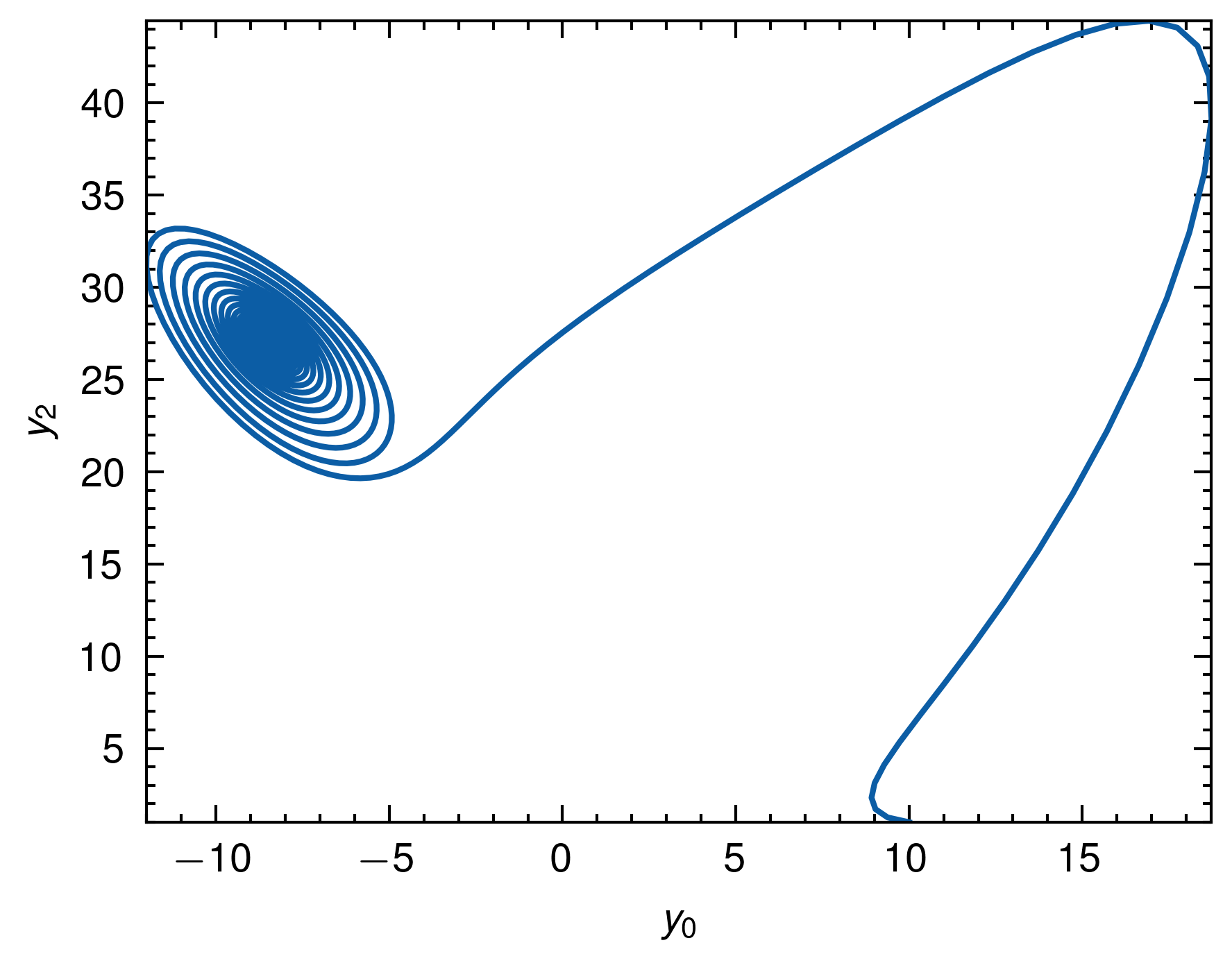[−][src]Module peroxide::numerical::ode
Solver for ordinary differential equations
Introduce ODE Trait & Structure
ODE Trait
-
ODEstructures are divided by two kindsExplicitODEImplicitODE
-
ODEtrait is given asextern crate peroxide; use peroxide::fuga::{Real, State, BoundaryCondition, Environment}; pub trait ODE<E: Environment> { type Records; type Vector; type Param; type ODEMethod; fn mut_update(&mut self); fn integrate(&mut self) -> Self::Records; fn set_initial_condition<T: Real>(&mut self, init: State<T>) -> &mut Self; fn set_boundary_condition<T: Real>( &mut self, bound1: (State<T>, BoundaryCondition), bound2: (State<T>, BoundaryCondition), ) -> &mut Self; fn set_step_size(&mut self, dt: f64) -> &mut Self; fn set_method(&mut self, method: Self::ODEMethod) -> &mut Self; fn set_stop_condition(&mut self, f: fn(&Self) -> bool) -> &mut Self; fn set_times(&mut self, n: usize) -> &mut Self; fn check_enough(&self) -> bool; fn set_env(&mut self, env: E) -> &mut Self; }
Records: The type to save results of ODE. UsuallyMatrixis used.Vector: Vector can be below things.Vec<f64>: Used forExplicitODEVec<Dual>: Used forImplicitODE
Param: Also it can bef64orDualODEMethod: Method for solving ODEExMethod: Explicit methodEuler: Euler first orderRK4: Runge Kutta 4th order
ImMethod: Implicit method (to be implemented)BDF: Backward Euler 1st orderGL4: Gauss Legendre 4th order
Environment: External environment (CubicSpline, Vec, Matrix or Another external table)
State<T> structure
-
To use
ODEtrait, you should understandState<T>first.extern crate peroxide; use peroxide::fuga::Real; #[derive(Debug, Clone, Default)] pub struct State<T: Real> { pub param: T, pub value: Vec<T>, pub deriv: Vec<T>, }
Tcan bef64orDualparamis parameter for ODE. Usually it is represented by time.valueis value of each node.derivis value of derivative of each node.
For example,
$$ \frac{dy_n}{dt} = f(t, y_n) $$
- $t$ is
param - $y_n$ is
value - $f(t,y_n)$ is
deriv
Methods for State<T> are as follows.
to_f64(&self) -> State<f64>to_dual(&self) -> State<Dual>new(T, Vec<T>, Vec<T>) -> Self
Environment
Environmentneeds justDefault- To use custom
Environment, just type follows :impl Environment for CustomType {} - If you don't want to use
Environment, then useNoEnv - Implemented Data Types
Vec<f64>PolynomialMatrixCubicSplineNoEnv
#[macro_use] extern crate peroxide; use peroxide::fuga::*; fn main() { let x = seq(0, 10, 1); x.print(); let y = x.iter().enumerate().map(|(i, &t)| t.powi(5-i as i32)).collect::<Vec<f64>>(); let c = CubicSpline::from_nodes(x, y); let init_state = State::<f64>::new(0f64, c!(1), c!(0)); let mut ode_solver = ExplicitODE::new(test_fn); ode_solver .set_method(ExMethod::RK4) .set_initial_condition(init_state) .set_step_size(0.01) .set_times(1000) .set_env(c); let result = ode_solver.integrate(); result.print(); } fn test_fn(st: &mut State<f64>, env: &CubicSpline) { let x = st.param; let dy = &mut st.deriv; dy[0] = env.eval(x); }
ExplicitODE struct
ExplicitODE is given as follow :
extern crate peroxide; use std::collections::HashMap; use peroxide::fuga::{State, ExMethod, BoundaryCondition, ODEOptions, Environment}; #[derive(Clone)] pub struct ExplicitODE<E: Environment> { state: State<f64>, func: fn(&mut State<f64>, &E), step_size: f64, method: ExMethod, init_cond: State<f64>, bound_cond1: (State<f64>, BoundaryCondition), bound_cond2: (State<f64>, BoundaryCondition), stop_cond: fn(&Self) -> bool, times: usize, to_use: HashMap<ODEOptions, bool>, env: E, }
state: Current param, value, derivativefunc: Function to updatestateinit_cond: Initial conditionbound_cond1: If boundary problem, then first boundary conditionbound_cond2: second boundary conditionstop_cond: Stop condition (stop beforetimes)times: How many times do you want to update?to_use: Just check whether information is enoughenv: Environment
Example
Lorenz Butterfly
extern crate peroxide; use peroxide::fuga::*; fn main() { // ========================================= // Declare ODE // ========================================= let mut ex_test = ExplicitODE::new(f); let init_state: State<f64> = State::new( 0.0, vec![10.0, 1.0, 1.0], vec![0.0, 0.0, 0.0], ); ex_test .set_initial_condition(init_state) .set_method(ExMethod::Euler) .set_step_size(0.01f64) .set_times(10000); let mut ex_test2 = ex_test.clone(); ex_test2.set_method(ExMethod::RK4); // ========================================= // Save results // ========================================= let results = ex_test.integrate(); let results2 = ex_test2.integrate(); // Plot or extract } fn f(st: &mut State<f64>, _: &NoEnv) { let x = &st.value; let dx = &mut st.deriv; dx[0] = 10f64 * (x[1] - x[0]); dx[1] = 28f64 * x[0] - x[1] - x[0] * x[2]; dx[2] = -8f64/3f64 * x[2] + x[0] * x[1]; }
If plotting pickle data with python, then


Simple 1D Runge-Kutta
$$\begin{gathered} \frac{dy}{dx} = \frac{5x^2 - y}{e^{x+y}} \\ y(0) = 1 \end{gathered}$$
#[macro_use] extern crate peroxide; use peroxide::fuga::*; fn main() { let init_state = State::<f64>::new(0f64, c!(1), c!(0)); let mut ode_solver = ExplicitODE::new(test_fn); ode_solver .set_method(ExMethod::RK4) .set_initial_condition(init_state) .set_step_size(0.01) .set_times(1000); let result = ode_solver.integrate(); // Plot or Extract.. } fn test_fn(st: &mut State<f64>, _: &NoEnv) { let x = st.param; let y = &st.value; let dy = &mut st.deriv; dy[0] = (5f64*x.powi(2) - y[0]) / (x + y[0]).exp(); }
Structs
| ExplicitODE | |
| ImplicitODE | |
| NoEnv | |
| State | State for ODE |
Enums
| BoundaryCondition | Kinds of Boundary Conditions |
| ExMethod | Explicit ODE Methods |
| ImMethod | |
| ODEOptions | Options for ODE |
Traits
| Environment | |
| ODE | ODE solver |